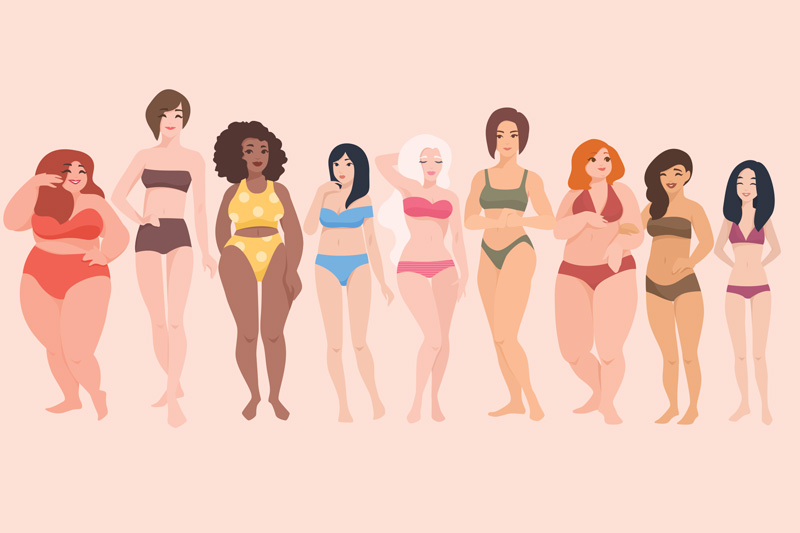Developing a More Positive Body Image
 Every day we see hundreds of images of people in television, movies, advertisements, and our own community. It is very easy to fall into the trap of comparing oneself to others, and negative body image has become a common practice for many of us. Despite knowing it’s not a healthy practice, it’s tough to avoid – especially since there’s so much to look at on social media. The desire to “fit in” and measure up to what people see as the “perfect body” can significantly increase the risk of developing an eating disorder.
Every day we see hundreds of images of people in television, movies, advertisements, and our own community. It is very easy to fall into the trap of comparing oneself to others, and negative body image has become a common practice for many of us. Despite knowing it’s not a healthy practice, it’s tough to avoid – especially since there’s so much to look at on social media. The desire to “fit in” and measure up to what people see as the “perfect body” can significantly increase the risk of developing an eating disorder.
However, there is no need to feel pressured to conform; instead, focus on maintaining a positive body image in conjunction with a well-balanced diet and exercise. There are plenty of self-esteem boosters to incorporate into your daily life too. If you feel like the pressure is too much to handle on your own, seek an eating disorder treatment to help you turn your perspective around and feel more confident about your body.
Focusing on the Positives
Peer pressure can play a part in how you feel about yourself. Friends may be envious of how one another looks and try to compete to feel better about themselves. In reality, this can make you feel worse because you’re constantly comparing yourself to someone else, and everyone is built differently.
Writing the Good List
Focus on the things you like about yourself. They don’t have to have anything to do with how you look. Maybe you like your sense of humor, your ability to peel an apple in one long strand, or how you speak two languages. Loving yourself goes a long way – and that means all parts of yourself.
What You Can Do, I Can Too
Appreciate your body for all that it can do. Running, swimming, dancing, swinging, and climbing with your kids on the playground. Having all your fingers, senses, limbs and organs is a gift. You may feel like you don’t have the perfect look, but it doesn’t stop you from doing amazing things.
Positive Mindset from Positive Stories
Take some time each day to read uplifting books or articles that make you feel good about yourself. Keep a journal of quotes you find inspiring to boost your mood and self-esteem. Seek out feel-good stories that remind you that people have empathy, compassion, and goodness at heart. It’s okay to avoid some of the negative news going around.
Cutting Down on Digital Hours
Spending too much time online can alter the body image you have of yourself and increase your risk of developing an eating disorder. Some people turn to food to comfort themselves after they’ve seen too many images of people that they think look better than they do. Some embark in dangerous food restrictive practices that can compromise one’s nutrition and create malnutrition.
Slash Time with Your Devices!
Cut back on how much time you spend online or on your phone checking social media and posting pictures. In the treatment of eating disorders, curbing this type of negative influence and imagery is essential.
Evading Online Pressure
Skip over sites or articles that make you feel bad about yourself or question how you look. Consider taking a time out from social media and focusing on you and the real world around you.
A Positive Circle
Spend time each day creating a positive mindset for yourself, whether that’s through meditation, reading positive quotes, exercising, or repeating an encouraging mantra to yourself. Seek counseling for depression and anxiety if they are keeping you from feeling your best.
Be Nice to Yourself
Do your best to create a body you feel comfortable in. Wear what makes you feel good. Engage in daily exercise to reduce stress, release endorphins, and manage weight. If body image has become an issue, counseling for eating disorders can help you get on the road to recovery and effectively meet your physical needs.
Saying ‘no!’ to Self-Destructive Behavior
Make it a point to do things each day that make you feel good inside and out. Volunteer. Play with your kids. Disconnect from the digital world for a while. Skip the crash diets and crazy workout routines. Find a balance that works for you and your body’s needs.
You are in control of how you see your body, so don’t let anyone take that away from you. Strive to keep a positive mindset and love yourself for who you are. Find a program that focuses on the treatment of eating disorders if negative thoughts and behaviors have become problematic.
Crossroads provides women with the comprehensive care they need to embark on recovery from addiction and eating disorders and remember who they wanted to be. Crossroads is a fully accredited addiction and behavioral health treatment center based in Scarborough, Maine. Clients engage in evidence-based, gender-responsive treatment to build the skills and strategies necessary to support long-term recovery. For more information, visit: www.crossroadsme.org.




